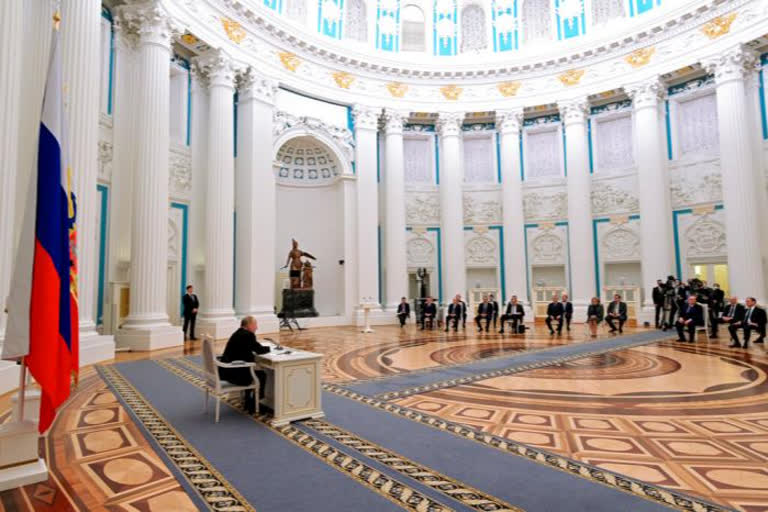Moscow: Russian lawmakers gave President Vladimir Putin permission to use military force outside the country on Tuesday — a move that could presage a broader attack on Ukraine after the U.S. said an invasion was already underway there. Several European leaders said earlier in the day that Russian troops have moved into rebel-held areas in eastern Ukraine after Putin recognized their independence. But it was unclear how large the movements were, and Ukraine and its Western allies have said Russian troops have been fighting in the region since the separatist conflict erupted in 2014. Moscow denies those allegations.
Members of the upper house, the Federation Council, voted unanimously to allow Putin to use military force outside Russia — effectively formalizing a Russian military deployment to the rebel regions, where an eight-year conflict has killed nearly 14,000 people. The White House on Tuesday began referring to Russian troop deployments in eastern Ukraine as an “invasion” after initially hesitating to use the term — a red line that President Joe Biden has said would result in the U.S. levying severe sanctions against Moscow.
“We think this is, yes, the beginning of an invasion, Russia’s latest invasion into Ukraine,” said Jon Finer, principal deputy national security adviser, said in an interview on the media. “An invasion is an invasion and that is what is underway.” The White House decided to begin referring to Russia’s actions as an “invasion” because of the situation on the ground, according to a U.S. official who spoke on the condition of anonymity to discuss internal deliberations. The administration resisted initially calling the deployment of troops because the White House wanted to see what Russia was actually going to do. After assessing Russian troop movements, it became clear it was a new invasion, the official added.
White House press secretary Jen Psaki also alluded to the Russian action as being an invasion in a twitter post commenting on Germany chancellor Olaf Scholz decision to halt the Nord Stream 2 gas pipeline in response to Russia’s actions. The U.S. president “made clear that if Russia invaded Ukraine, we would action would act with Germany to ensure Nord Stream 2 does not move forward,” Psaki said.
For weeks, Western powers have been bracing for an invasion as Russia massed an estimated 150,000 troops on three sides of neighboring Ukraine. They warned an attack would cause massive casualties, energy shortages in Europe and economic chaos around the globe — and promised swift and severe sanctions if it materialized. The European Union and Britain announced Tuesday that some of those measures were coming.
Western leaders have long warned Moscow would look for cover to invade — and just such a pretext appeared to come Monday, when Putin recognized as independent two separatist regions in eastern Ukraine, where government troops have fought Russia-backed rebels in a conflict that has killed over 14,000 people. The Kremlin then raised the stakes further Tuesday, by saying that recognition extends even to the large parts now held by Ukrainian forces.
Kremlin spokesman Dmitry Peskov said that Russia has recognized the rebel regions’ independence “in borders that existed when they proclaimed” their independence in 2014 — broad territories that extend far beyond the areas now under the rebel control and that include the major Azov Sea port of Mariupol. Putin's move to recognize the territories' independence opened the door for him to formalize his hold on them and send forces in, though Ukraine and its Western allies have charged Russian troops have been fighting there for years. Moscow denies those allegations. Condemnation from around the world was quick. Ukrainian President Volodymyr Zelenskyy said he would consider breaking diplomatic ties with Russia and Kyiv recalled its ambassador in Moscow.
But confusion over what exactly was happening in eastern Ukraine threatened to hobble a Western response. While the U.S. clearly called it an invasion, some other allies hedged. “Russian troops have entered in Donbas,” the name for the area where the two separatist regions are located, EU foreign policy chief Josep Borrell said in Paris. “We consider Donbas part of Ukraine.”
But in a distinction that could complicate a European and Western response, he added: “I wouldn’t say that (it is) a fully fledged invasion, but Russian troops are on Ukrainian soil.” Poland's Defense Ministry and British Health Secretary Sajid Javid also said Russian forces had entered Ukraine's east, with Javid telling Sky News that “the invasion of Ukraine has begun.” Not all in Europe saw it that way. Spanish Foreign Minister José Manuel Albares noted “if Russia uses force against Ukraine, sanctions will be massive.”
